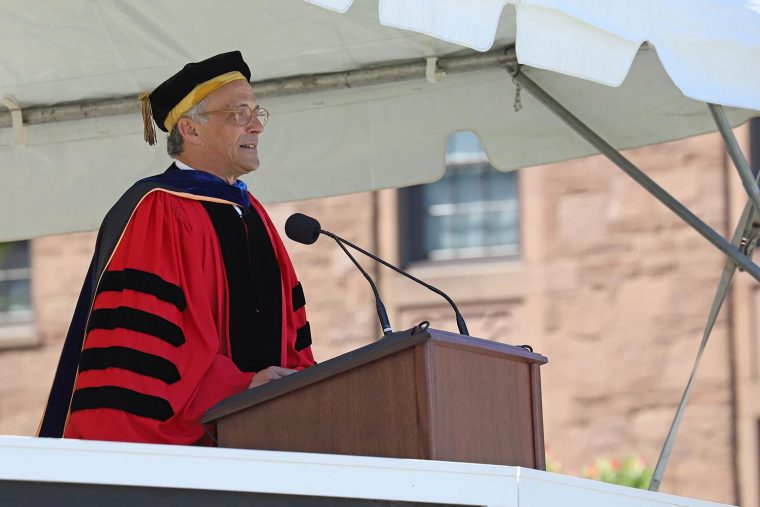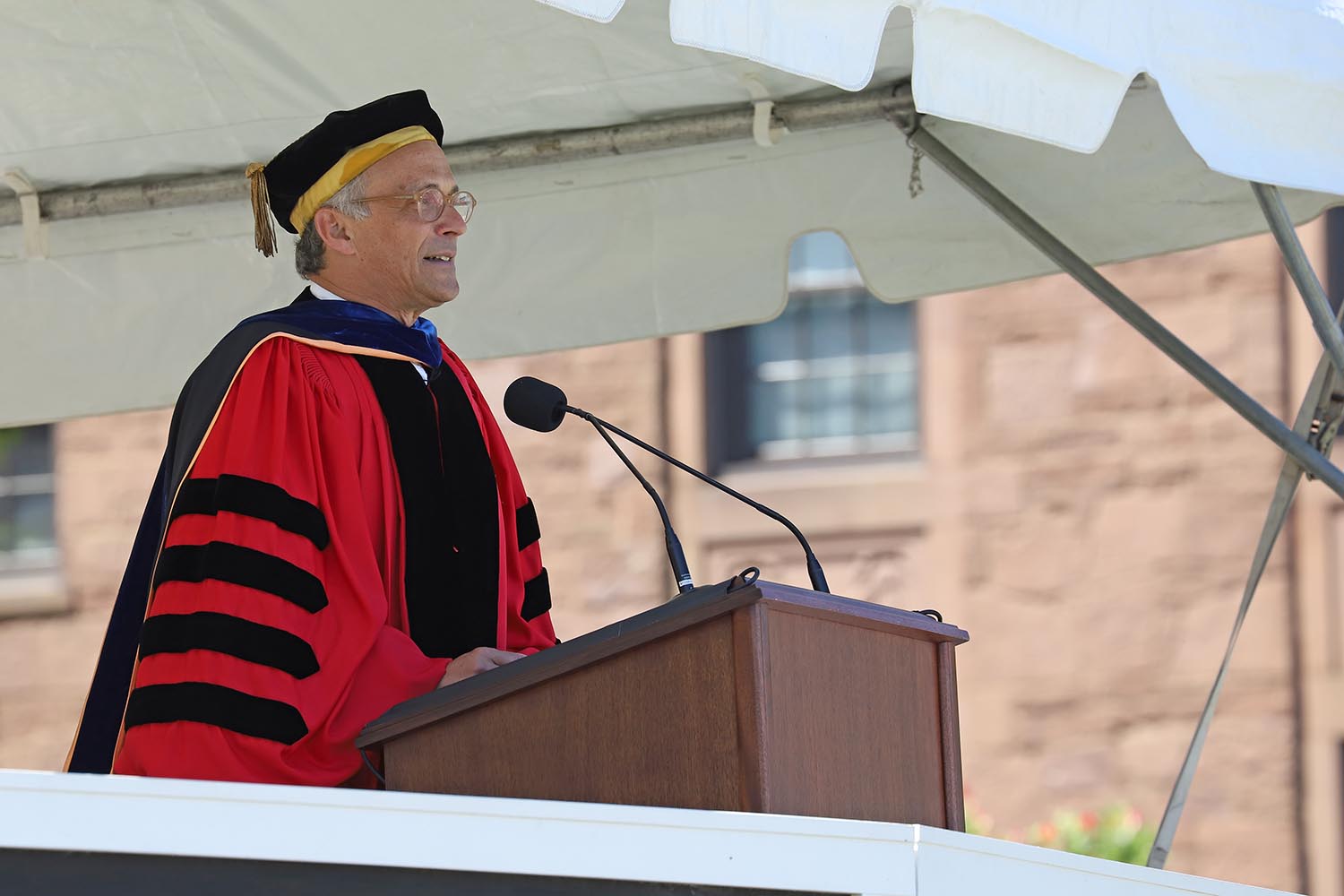President Roth Makes Remarks at 2019 Commencement


Wesleyan President Michael Roth ’78 made the following remarks (as prepared) during the 187th Commencement ceremony on Sunday, May 26:
Members of the Board of Trustees, members of the faculty and staff, distinguished guests, new recipients of graduate degrees and the mighty Class of 2019, I am honored to present some brief remarks on the occasion of this Commencement.
I’d like to ask those graduating today to remember the months before you left for college. Do you recall the excitement, nervousness, and anticipation you felt when you first arrived on campus? Meeting your roommates for the first time, getting your first pail from WesWings, discovering that watching volleyball can be terrifically exciting? As your Wesleyan adventure was beginning and your life was changing, the political life of this nation was also changing, though not for the better. Would-be leaders were abandoning the debate of issues in favor of nastiness and name calling, as they tried to figure out how to energize the base of their respective constituencies. The search for coherent policies, for value-driven strategies, or for pragmatic solutions took a back seat to intemperate appeals to racism, class resentment, divisiveness, and greed. Now, in 2019, the goal of mobilizing supporters with rage has been cemented into our national political culture. That’s the culture you now graduate into; that’s the culture we need your help fixing. The post-fascists tell us inquiry and persuasion no longer matter; we need your help in proving them wrong; we need your help in overcoming their corrosive, corrupt, and cynical point of view.
And with what you have learned here and skills you have gained, you CAN help. Some of you have studied government, others economics, while still others have taken a humanistic approach to comprehending how power, justice, and opportunity might be distributed more fairly, even more compassionately. Data analysts, like those who have worked with the Wesleyan Media Project, have illuminated the ways political communication is influenced by funding and by diverse technological platforms. Ethnographers, like those who have worked with our activist Anthropology faculty, have learned how to listen to and tell the stories of those most affected by policies otherwise made without their input. There is also a more general frame of mind cultivated at Wesleyan that is crucial to political life: and that is the openness to being persuaded to change one’s mind—to seek out those from whom you can gain new perspectives and ideas precisely because they don’t share your point of view. A campus is the place to have one’s ways of thinking tested—not just protected. If we are to repair our public life, we must develop habits of mind and spirit that allow us not just to celebrate diversity, but to learn from difference.
One of the reasons I love being president of our school is that I learn so much from the enthusiasms, the convictions, and the reasoned arguments of our students. Over the last four years, I have been energized by the hard work of activists aiming to eradicate the persistent poison of sexual violence, and I have been schooled by students who have faced up to the immense challenges of combating climate change, or who struggle against economic inequality. Students of faith have shown me how religious practice and rigorous inquiry can be combined, and conservative students have taught me to be mindful that even well-intentioned policies can undermine our freedoms. There have been many times when our campus community seems to come together in recognition of unjust situations that need fixing, but it has also been clear that there can be plenty of disagreement about what would constitute effective solutions that don’t themselves create even graver injustices. On our best days, we are able to explore our differences without fear; on our best days, we are able to work toward positive change with courage.
Now, as you take on new challenges beyond the University, we are counting on you. We are counting on you to reject the dismissal of norms for telling the truth and the labeling of anything one doesn’t like as “Fake” or as “Inappropriate.” We are counting on you to protect the freedom to think for oneself and to speak one’s mind, especially in situations where people disagree. We are counting on you to show others the power of listening to those with whom you have conflicts. We are counting on you to move beyond accumulating online followers to earning the respect of strangers—turning them into neighbors, teammates, friends who can work together.
Over these four years, I have gotten to know many of you in my classes, in student government, and even in demonstrations. In your courageous company I feel we may well be able to reject the cynical status quo that mobilizes rage, that we may be able to build a politics and a culture of compassionate solidarity rather than of fear and divisiveness.
Generations of Wesleyan alumni have benefited from this campus culture characterized by brave, practical idealism. As I say each year, we Wesleyans have used our education for the ‘good of the world,’ lest the future be shaped by those for whom justice and change, generosity and equality, diversity and tolerance, are much too threatening. Now we alumni are counting on you, Class of 2019, to join us in helping to shape our culture, so that it will not be shaped by the forces of violence, conformity, and elitism.
We are counting on you because we have already seen what you are capable of when you have the freedom and the tools, the mentors and the friendships, the insight and the affection to go beyond what others have defined as your limits. We know that in the years ahead you will explore unfamiliar realms and see possibilities that others might not. We know that you will find new ways to make connections across cultural borders—new ways to build community. When this happens, you will feel the power and promise of your education. And we, your Wesleyan family, we will be proud of how you keep your education alive by making it effective in the world.
It’s been nearly four years since we unloaded cars together at the base of Foss Hill, four years since parents shed (or maybe hid) a tear as they left you here “on your own.” It seems like such a short time ago. Now it’s you who are leaving us, but do remember that no matter how “on your own” you feel yourselves to be “out there,” you will always be members of the Wesleyan family. Wherever your exciting pursuits take you, please come home to alma mater often to share your news, your memories, and your dreams. Thank you and good luck!

